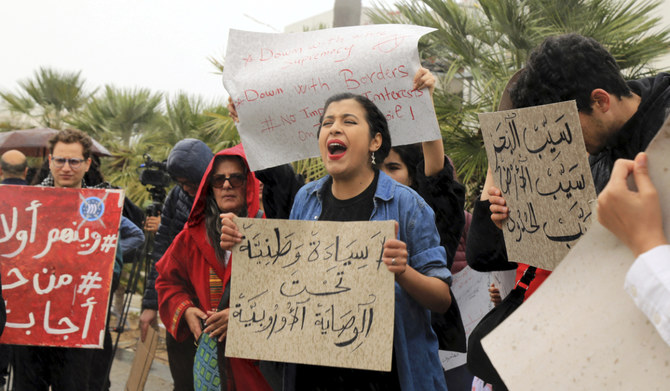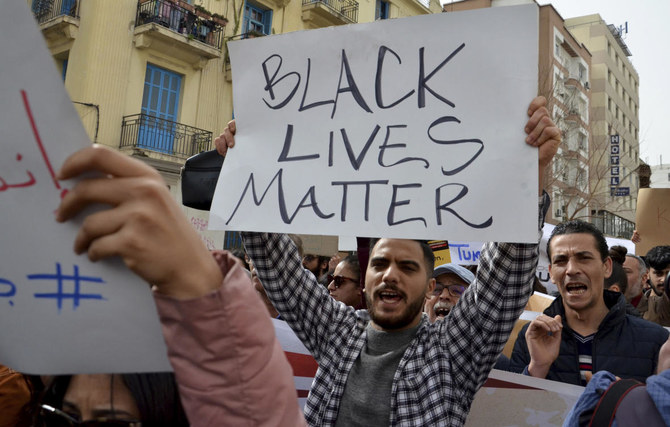TUNIS: Tensions in Tunisia ratcheted up as demonstrators seeking better rights for migrants staged a sit-in before EU headquarters, capping a week in which Tunisian authorities targeted migrant communities from the coast to the capital with arrests and the demolition of tent camps.
Several activists were apprehended this week, accused of financial crimes stemming from providing aid to migrants. Authorities razed encampments outside UN headquarters, sweeping up dozens of sub-Saharan Africans who had been living there for months. Fewer migrants have made the dangerous journey across the Mediterranean Sea this year than last due to weather and beefed-up border security.
The 2024 figures align with objectives set by the EU as part of a deal worth more than €1 billion ($1.1 billion) that included assistance to better police the border and prevent migrants without papers from reaching Europe.
However, human rights activists say the crackdown has been damaging for the tens of thousands of migrants stuck in Tunisia as a result.
Demonstrators blasted the security-centric approach governments on both sides of the Mediterranean Sea have chosen to drive their migration policies. Some of the signs at the protests decried Tunisia’s cooperation with Italy and Europe, while others mourned the lives of Tunisians who had died or gone missing at sea.
Bodies continue to wash ashore on the country’s central coastline not far from small towns where migrants have clashed with police and farmers have grown increasingly wary of the growing presence of encampments in olive groves where they make their livings, claiming rampant theft and staging protests demanding government intervention, according to local media.
According to figures from Italy’s Interior Ministry on May 8, the number of migrants reaching Italy in 2024 fell by two-thirds compared to the same point last year.
The UN refugee agency UNHCR reported that more than 24,000 migrants traveled from Tunisia to Italy in the first four months of 2023 while fewer than 8,000 had successfully made the journey over the same period this year.
These trends relieve pressure on European officials hoping to avoid overcrowded detention centers, high numbers of asylum claims and increased concern about immigration ahead of EU parliamentary elections in June.
But in Tunisia, an opposite reality is taking shape.
In April, authorities directly thwarted 209 migration attempts and prevented more than 8,200 migrants, the majority from sub-Saharan African countries, from reaching Italy.
The Tunisian Coast Guard said it had prevented more than 21,000 migrants from reaching Italy this year.
“Tunisia is deepening the crisis and promoting the idea that there is no solution,” Romdane Ben Amor of the Tunisian Forum for Economic and Social Rights, a leading NGO known by its French abbreviation FTDES, told Radio Mosaïque, the country’s largest private radio station.
President Kais Saied acknowledged on Monday that migrants were deported from coastal cities to the borderlands in “continued cooperation” with neighboring countries.
He claimed that pro-migrant “traitors and agents” were being funneled millions in euros and dollars to help settle migrants without legal status in Tunisia.
He made similar remarks last year when he said sub-Saharan African migrants were part of a plot to erase his country’s identity.
His comments followed the arrest earlier this week of Saadia Mosbah, a Black Tunisian anti-discrimination activist, and Sherifa Riahi, the former president of an asylum rights group.
Mosbah was taken into custody, and her home was searched as part of an investigation into the funding for the Mnemty association she runs.
She was arrested after she posted on social media condemning the racism she faced for her work from people accusing her of helping sub-Saharan African migrants, said Bassem Trifi, the president of the Tunisian League for the Defense of Human Rights.
Riahi was arrested on Wednesday under the same financial crimes law, Radio Mosaïque reported.
Last week, more than 80 migrants were arrested in Tunis after clashes with law enforcement during the clearance of encampments in the capital that the authorities said were “disturbing the peace,” according to Radio Mosaïque.
Hundreds of migrants had camped near the headquarters of UNHCR and the International Organization for Migration, many of them demanding the agencies resettle them outside of Tunisia. Law enforcement used heavy machinery to raze their tents and then bused them outside of the city to “an unknown destination,” said Ben Amor from FTDES.
An estimated 244 migrants — most of them from outside Tunisia — have died or disappeared along the country’s Mediterranean coastline this year, including 24 whose bodies were found last week, the NGO said.
A report based on government data released Monday noted that the number of migrants without papers crossing the Mediterranean had decreased as Tunisian authorities reported increasing interceptions.
This was the case for migrants from Tunisia and migrants passing through the country en route to Europe.
North African and European officials have sought to curb human trafficking and improve the policing of borders and coastlines to prevent deaths at sea.
However, thousands of migrants fleeing conflict, poverty, persecution or hoping for a better life have continued to make the journey.
They take boats from the coast north of Sfax, Tunisia’s second-largest city, to Italian islands such as Lampedusa, about 130 km away.
The European Union hopes to limit migration with policies that include development assistance, voluntary return, and repatriation for migrants, as well as forging closer ties with neighboring governments that police their borders. The EU and member countries such as Italy have pledged billions of dollars over the past year to countries including Tunisia, Mauritania, and Egypt to provide general government aid, migrant services, and border patrols.

















